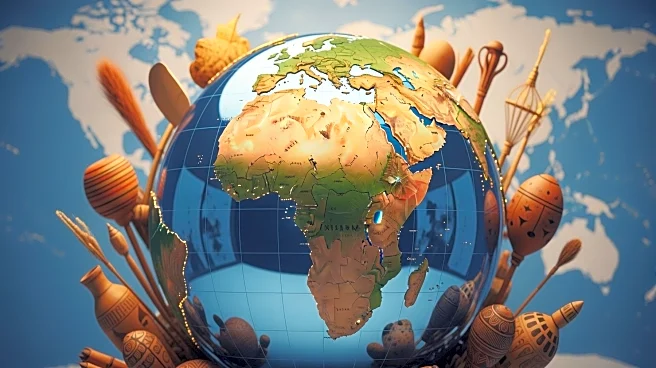What's Happening?
President Donald Trump is reportedly considering a strategic shift in U.S. foreign policy towards Africa, a continent rich in resources and geopolitical significance. Analysts suggest that Trump's transactional
diplomacy could align well with African leaders' preference for clear, trade-focused relationships over traditional aid structures. This approach could potentially enhance U.S. influence in Africa, especially in the context of growing competition with China, which has established strong economic ties across the continent. The U.S. currently lags behind China in terms of trade volume and investment in Africa, particularly in critical minerals and infrastructure projects. Trump's administration is exploring opportunities to establish regional processing hubs in Africa, which could create jobs and secure supply chains, aligning with African aspirations and U.S. strategic needs.
Why It's Important?
The potential shift in U.S. policy towards Africa under President Trump could have significant implications for global geopolitics and economic dynamics. Africa's vast reserves of critical minerals are crucial for modern technologies, and securing these resources is vital for U.S. economic and strategic interests. By enhancing trade relations and investing in African infrastructure, the U.S. could counter China's dominance in the region and strengthen its global supply chains. This move could also foster economic growth in African nations, providing them with more autonomy and reducing dependency on Chinese investments. The success of this strategy could redefine U.S.-Africa relations and contribute to a more balanced global power structure.
What's Next?
If President Trump proceeds with this strategic shift, the U.S. may need to develop comprehensive policies that address both economic and political dimensions of its engagement with Africa. This includes building partnerships that respect African agency and offer tangible benefits. The U.S. could focus on sectors like digital transformation, leveraging its leadership in technology to foster entrepreneurship and human capital development in Africa. Additionally, the U.S. might need to navigate complex geopolitical landscapes, balancing its interests with those of other global powers like China and Russia, which have also increased their presence in Africa.
Beyond the Headlines
The potential U.S. policy shift towards Africa under President Trump could also have ethical and cultural implications. Engaging with Africa on a more equal footing could help dismantle outdated perceptions and foster mutual respect. It could also challenge the traditional Western approach to foreign aid, promoting a model that emphasizes partnership and shared growth. This strategy might also influence other Western nations to reconsider their engagement with Africa, potentially leading to a broader reconfiguration of international relations.









